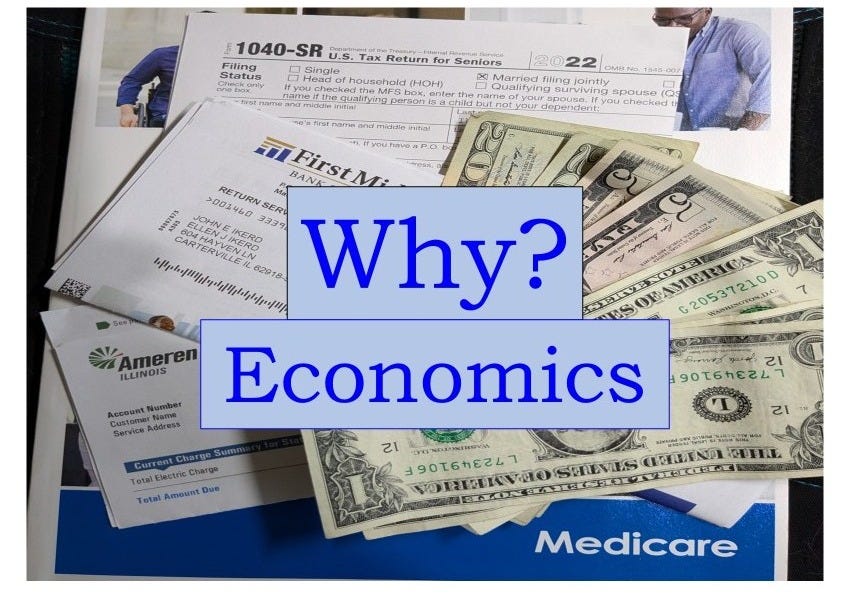I have been reluctant to start a blog. I’m retired and don’t need or want a job. I grew up on a family dairy farm, and the cows had to be milked every morning and night, regardless of what I might rather be doing. I’m too old to go back to anything like milking cows. I already have two websites and a journal column and have posted regularly on Facebook and LinkedIn. However, responses to my previous posts suggest considerable misunderstanding and skepticism regarding economic issues. I felt I should do something more to help people understand everyday economic concerns. So, beginning in January, I will try to post at least a couple of times a month, but I’m not making promises or setting deadlines.
“Why? Economics” refers to the “why-questions” people ask about economics. Why did I choose this name? First, I want to give some common-sense answers to commonly asked questions about economics. There are timely questions, such as why people feel the economy is bad and why prices didn’t come down after the COVID pandemic. There are also general questions, such as why we never seem to have enough money and why we need money in the first place or even need an economy. I will ask and answer some of both kinds.
There are questions about the government’s role in the economy, such as why the government has a monopoly on money and why the government needs to regulate corporations. People also have “why-don’t” and “why-not” questions, such as why don’t corporations behave like real people and why not run the government like a business. I also invite readers to ask their own “why questions.”
Second, I am an economist. I have a Ph.D. in Agricultural Economics and had a 30-year academic career in teaching, research, and extension at four state universities. When I retired in early 2000, I was granted the status of Professor Emeritus. Yes, agricultural economists are real economists. We took the same graduate economics courses as students in the College of Arts and Science. In addition, we were taught that land and management, as well as labor and capital, are essential for production. Agricultural economists understand, or ought to understand, that everything of use to us, including all things of economic value, ultimately comes from “the land”—the earth: soil, air, water, and sunlight. If we don’t use the things of the Earth wisely, we can’t sustain the economy. I have written six books and dozens of journal articles, book chapters, and professional papers on economics, agriculture, and sustainability.
I have also spent most of my life trying to understand why things are the way they are and why people don’t change things to what they want them to be. I am certainly not unique in this respect. George Bernard Shaw is credited with the quote: “There are those that look at things the way they are, and ask why? I dream of things that never were, and ask why not?” I think both are important. The ultimate answers to all questions of why depend on the purpose of life, which can’t be proven but is accepted as a matter of faith. I believe in the inherent goodness of life, the Earth, the universe, and beyond. I believe we are meant to contribute to that goodness. My belief affects my answers to questions of why. Anyway, my answers will reflect a lifetime of curiosity.
That said, I don’t claim to have all the “right” answers or to hold a monopoly on truth. I will write “my truth,” meaning what I believe to be true based on my unique life experiences. If your truth differs from mine, that’s okay with me, as long as it’s “your truth” and not just something you have read or heard someone else say. We need to think for ourselves and decide what is true for ourselves. We can learn from each other without arguing about who is right.
I will try to stick with commonsense answers to everyday questions. I will leave it to others to reveal the complexities of economic theories, institutions, and policies. If you want to read more about what I believe are the most important questions in economics, my books are available from the publishers or through Amazon.com. I consider Joseph Stiglitz and Amartya Sen two of the best internationally recognized general economists. Stephanie Kelton and Ellen Brown focus on financial markets, fiscal policy, and money. Robert Reich and David Corten write and speak about the corporate world and the need for government regulation of markets. Kate Raworth’s “Doughnut Economics” illustrates the social and ecological limits of the economy. [See links below] I don’t want to try to do what others can do better. I will try to stick to generalizations and suggest places where you can dig deeper.
Finally, you have received this blog post because we know each other or have communicated previously about speaking engagements, writing projects, or other professional activities. I only selected names from my address book of people I thought might be interested in a blog about economics. However, I get far more emails than I can read and I suspect you do too. So, I won’t be offended if you decide you have higher priorities for your time and unsubscribe. If you know of other people who may not be on my list, please share a post with them, allowing them to subscribe. Shares on social media will also be appreciated. Regardless of what you decide, I appreciate your consideration.
John Ikerd
Notes:
https://www.amazon.com/stores/John-E.-Ikerd/author/B001JOW2Y8
https://www.foodsystemsjournal.org/index.php/fsj/article/view/1298
https://en.wikipedia.org/wiki/Joseph_Stiglitz
https://en.wikipedia.org/wiki/Amartya_Sen
https://ellenbrown.com/
https://davidkorten.org/
https://www.kateraworth.com/blog/






I'll be reading your posts John. Happy holidays!
Thankyou for starting this Substack. I know so little about economics.